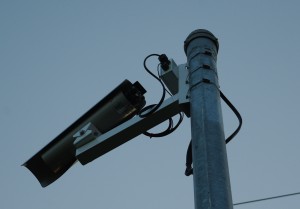
Gone are the days when local law enforcement used roadside cameras to simply enforce local traffic laws. Gone are the days when the legal presumption of innocence trumped the public desire for preemptive security.
The age of big data is the age of big surveillance — and it is upon us.
A national network of cameras recording individual license plates and storing data on where each car is driving every day—to the tune of three million records a week from Los Angeles law enforcement alone—is swiftly developing in local precincts across the United States. The storage of these records can last for years and you’ll never be able to see what authorities have recorded about your traveling habits.
A California court recently ruled that the vast records recorded by local authorities may not be viewed by innocent members of the public. Like many other states, California has a public records law that should give innocent citizens access to the public information collected by these cameras, according to one man suing for access the information collected on his vehicles; “If I’m not being investigated for a crime, there shouldn’t be a secret police file on me” that details “where I go, where I shop, where I visit.”
But some judges in California disagree. Because the collected data about innocent drivers is combined with everyone else’s information, the state can claim that all the data pertains to on-going police investigations, thus exempting it, in their minds, from public information accountability laws.
If law enforcement can’t put a tracking device on a car of someone who is under active surveillance without probable cause and judicial approval, how can tracking and recording the movements of every vehicle be legally justifiable?
In short, in can’t. But a time of worldwide terrorism has bolstered the demand for public safety, and that demand is again butting heads with the Constitutional freedoms guaranteed to the American people. Fighting crime with the full extent of the government’s technological capacity is, in theory, an agreeable goal. But situations like these prove that prudence and careful analysis are of the utmost importance for the sake of preserving privacy protections for every innocent American against the powers of big government in the form of law enforcement and homeland security.
Developments in technology have evolved law enforcement officers’ capabilities to a remarkable extent. But it has had the unintended consequence of creating situations like this. The result is an important question for the American people: Just how interested are we in preserving our personal security while fighting for national security?
Modern technological capabilities of the proverbial “Big Brother” go far beyond the science fiction imaginations of even a generation ago. Vast warehouses storing personal information about the American people, down to where you drive your car, are not a reality of only conspiracy theories.
Now is the time for the American people to be realistic about our national capabilities and decide for ourselves what the boundaries of government will be before Washington’s unaccountable bureaucracies decide for us.
Tom Toth is the digital content director and a contributing editor for Americans for Limited Government.







